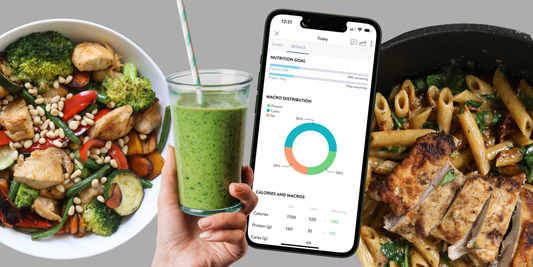
YOUR GUIDE TO CALORIE DEFICITS
Nutrition | 7 May 2025
If fat loss is your goal, you've probably heard the term calorie deficit thrown around, but what does it actually mean, and how do you do it right? Let’s break it down.
A calorie deficit simply means consuming fewer calories than your body burns in a day. When this happens, your body turns to stored energy (a.k.a body fat) for fuel, which leads to fat loss over time.
What is a Calorie Deficit?
Think of it like this: your body needs a certain amount of energy (calories) to function daily, from your workouts to your digestion to simply breathing and sitting around (scrolling, probably). When you provide slightly less energy than it needs, it starts using the energy it already has stored (fat) to make up the difference. That’s the magic of fat loss.
How Do You Create a Calorie Deficit Safely?
The first step to achieving a healthy, sustainable calorie deficit is knowing your own unique calorie and macro balance. This will depend on your age, weight, activity level, muscle mass, and personal goals.
Once you have these numbers, you can:
- Fuel your body with the right foods
- Stay consistent
- Track your progress more accurately
But here's the key: the deficit should be small enough to be manageable, and large enough to promote fat loss. Too big a deficit can leave you tired and hungry and even slow your metabolism.
Why Protein Matters
Consuming enough protein is essential during a calorie deficit. Here’s why:
- Protein helps preserve muscle mass while you're losing fat
- It keeps you fuller for longer, helping you avoid cravings and overeating
- It supports recovery from workouts and promotes overall body composition improvements
How Long Should You Stay in a Calorie Deficit?
A calorie deficit should be maintained for as long as it takes to reach your goal, but with sustainability in mind. Typically, 8 - 16 weeks is a great window to work within before taking a break. This allows your metabolism, hormones, and energy levels to reset, and gives your body time to maintain its new progress before the next phase.
The Bottom Line
A calorie deficit is one of the most effective ways to lose body fat, but only when it’s done right. It’s not about starving yourself or following extreme diets. It’s about eating the right foods, in the right amounts, and supporting your body through smart training and recovery.
Remember, progress doesn’t happen overnight, but with consistency and the right approach, your goals are absolutely within reach.

Want to know your own calorie and macro balance?
Our expert team is here to help you fuel right, feel strong, and see real results - discover our Custom Coaching programs today or try our FREE Macro Calculator.
Author | Annie Long
Annie is a qualified Nutritionist with a bachelor's degree in Nutrition and over 6 years of experience in the food industry. Whether catering for large fitness events or programming nutrition 1:1, Annie is passionate about supporting people to create healthy, positive eating habits that support their goals.




